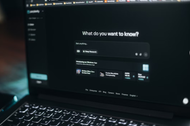
The death of the link: How the AI browser changes (almost) everything
There is always hype where AI is concerned – and the noise is always louder when it is ChatGPT and Sam Altman that are involved. Never knowingly under-sold, the pronouncements from that part of the Silicon Valley should always be viewed through narrowed eyes. This time, however…
The introduction of ChatGPT Atlas, OpenAI’s new web browser, is a significant, strategic challenge to Google and its dominant Chrome platform (launching for Apple users, but coming to a laptop near you soon). This isn't just a threat to Google's browser market share; it’s a direct assault on the advertising revenue model that has underpinned the internet economy for two decades. If a significant portion of ChatGPT's over 800 million users transition to Atlas, the financial implications for Google are substantial.
Historically, the browser was a passive window, largely defaulting to the option bundled with your operating system (which is why Microsoft Edge persists). Atlas, however, has the potential to fundamentally change how we interact with the internet.
And the browser you use on your phone or laptop is likely to be the default one that comes with the device or which your intransigent IT guy decided you had to use (which also explains the continued existence of Microsoft Edge). There are plenty of passive users who will seek the comfort of Google, but they too are switching to AI search (via Gemini and the AI Mode).
Atlas, though, has the potential to begin to change the way we interact with the internet.
Now, back in the day, Google’s search engine changed the way we gathered information. Before a reliable search engine arrived, websites were something we either knew about or came across through the doddering directions of engines like Ask Jeeves (ask your parents).
And for years after, the front page of a Google search has been the source of truth about a topic, person or company. Few went past the first page of a Search Engine Results Page (SERP). Anything beyond there may as well not have existed. Google by controlling discovery, effectively, hosted The Truth.
And that’s all changing – but rather than worry about Google, let’s worry about how it affects you and your company.
The first is the death of the Blue Link. The old model of search term/find link/read website is fading away already and the AI browser model will accelerate that. Traditional search isn’t dead yet (and Google search is still an option on Atlas), but the old search engine optimisation models (high up on page one) will matter less as AI summarises and analyses topics, without driving users to your domain. The digital visibility of your brand is thereby under threat.
The Atlas browser takes that a step further with its Agent Mode. While the product title might have emerged from the mind of a teenager, the shift in the perception of a company or service is likely to be significant. It allows AI to perform complex, multi-step tasks on the user's behalf. This moves the focus from "finding information" (send me a link) to "achieving a goal" (tell me what to do). So, if a user is looking to compare services, for example, the browser would do that for you.
And that’s significant for your website content strategy. Content design previously has always centred on the user – and has always assumed that the user is a human. Now the assumption should be that the user is AI, so your company’s data and value proposition should be aimed at the Large Language Model, not the customer. That’s a big thing.
Atlas utilizes Browser Memories to build a durable profile of user history and preferences. The choices the AI model makes - the vendors it recommends, the facts it cites - will stick. The browser will actively steer the user back to those established choices: “You liked these last time, so here they are again.” This makes the authoritative content that the AI can scrape more critical than ever, as establishing trust early results in lasting loyalty from the AI assistant.
So what do you need to do?
Well, you need to talk to us, obviously, and let us help you grown your authority in the AI-centric world:
Your content strategy will no longer about looking for clicks and referrals from search engines, but and start structuring authoritative content that answers users’ questions and gives facts and data. It’s about building for LLMs that power AI search (and browsers) so that they identify you as authoritative, comprehensive and giving the best value.
And, thankfully, the old PR model isn’t dead either. Media still has its audiences and great value in itself, but, in this model that coverage has a wider value – those that cite your brand will give credibility and endorse the AI view of who and what you are. And that Tier One media coverage can also be cited in Wikipedia… which is scraped by AI…
In the coming years, we may look at Atlas as the harbinger of the new way we gather information, rather than the centrepiece, but it’s emergence is a useful prompt for companies to look again at the content they create, the website that houses it and the information ecosystem around them and to reconfigure it for a different model.
The good news is that a lot centres around the content that you create and the spaces that you own that hold it. If you want to discuss how you can adapt for that, then get in touch: digital@cardewgroup.com